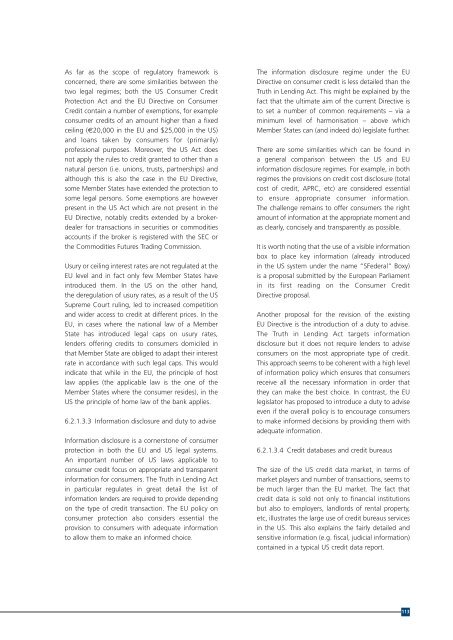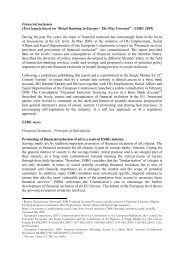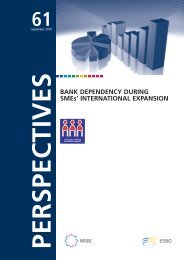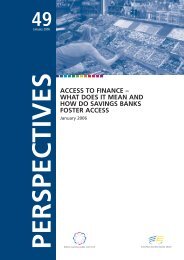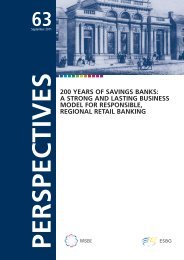A comparative analysis of the US and EU retail banking markets - Wsbi
A comparative analysis of the US and EU retail banking markets - Wsbi
A comparative analysis of the US and EU retail banking markets - Wsbi
Create successful ePaper yourself
Turn your PDF publications into a flip-book with our unique Google optimized e-Paper software.
As far as <strong>the</strong> scope <strong>of</strong> regulatory framework is<br />
concerned, <strong>the</strong>re are some similarities between <strong>the</strong><br />
two legal regimes; both <strong>the</strong> <strong>US</strong> Consumer Credit<br />
Protection Act <strong>and</strong> <strong>the</strong> <strong>EU</strong> Directive on Consumer<br />
Credit contain a number <strong>of</strong> exemptions, for example<br />
consumer credits <strong>of</strong> an amount higher than a fixed<br />
ceiling (€20,000 in <strong>the</strong> <strong>EU</strong> <strong>and</strong> $25,000 in <strong>the</strong> <strong>US</strong>)<br />
<strong>and</strong> loans taken by consumers for (primarily)<br />
pr<strong>of</strong>essional purposes. Moreover, <strong>the</strong> <strong>US</strong> Act does<br />
not apply <strong>the</strong> rules to credit granted to o<strong>the</strong>r than a<br />
natural person (i.e. unions, trusts, partnerships) <strong>and</strong><br />
although this is also <strong>the</strong> case in <strong>the</strong> <strong>EU</strong> Directive,<br />
some Member States have extended <strong>the</strong> protection to<br />
some legal persons. Some exemptions are however<br />
present in <strong>the</strong> <strong>US</strong> Act which are not present in <strong>the</strong><br />
<strong>EU</strong> Directive, notably credits extended by a brokerdealer<br />
for transactions in securities or commodities<br />
accounts if <strong>the</strong> broker is registered with <strong>the</strong> SEC or<br />
<strong>the</strong> Commodities Futures Trading Commission.<br />
Usury or ceiling interest rates are not regulated at <strong>the</strong><br />
<strong>EU</strong> level <strong>and</strong> in fact only few Member States have<br />
introduced <strong>the</strong>m. In <strong>the</strong> <strong>US</strong> on <strong>the</strong> o<strong>the</strong>r h<strong>and</strong>,<br />
<strong>the</strong> deregulation <strong>of</strong> usury rates, as a result <strong>of</strong> <strong>the</strong> <strong>US</strong><br />
Supreme Court ruling, led to increased competition<br />
<strong>and</strong> wider access to credit at different prices. In <strong>the</strong><br />
<strong>EU</strong>, in cases where <strong>the</strong> national law <strong>of</strong> a Member<br />
State has introduced legal caps on usury rates,<br />
lenders <strong>of</strong>fering credits to consumers domiciled in<br />
that Member State are obliged to adapt <strong>the</strong>ir interest<br />
rate in accordance with such legal caps. This would<br />
indicate that while in <strong>the</strong> <strong>EU</strong>, <strong>the</strong> principle <strong>of</strong> host<br />
law applies (<strong>the</strong> applicable law is <strong>the</strong> one <strong>of</strong> <strong>the</strong><br />
Member States where <strong>the</strong> consumer resides), in <strong>the</strong><br />
<strong>US</strong> <strong>the</strong> principle <strong>of</strong> home law <strong>of</strong> <strong>the</strong> bank applies.<br />
6.2.1.3.3 Information disclosure <strong>and</strong> duty to advise<br />
Information disclosure is a cornerstone <strong>of</strong> consumer<br />
protection in both <strong>the</strong> <strong>EU</strong> <strong>and</strong> <strong>US</strong> legal systems.<br />
An important number <strong>of</strong> <strong>US</strong> laws applicable to<br />
consumer credit focus on appropriate <strong>and</strong> transparent<br />
information for consumers. The Truth in Lending Act<br />
in particular regulates in great detail <strong>the</strong> list <strong>of</strong><br />
information lenders are required to provide depending<br />
on <strong>the</strong> type <strong>of</strong> credit transaction. The <strong>EU</strong> policy on<br />
consumer protection also considers essential <strong>the</strong><br />
provision to consumers with adequate information<br />
to allow <strong>the</strong>m to make an informed choice.<br />
The information disclosure regime under <strong>the</strong> <strong>EU</strong><br />
Directive on consumer credit is less detailed than <strong>the</strong><br />
Truth in Lending Act. This might be explained by <strong>the</strong><br />
fact that <strong>the</strong> ultimate aim <strong>of</strong> <strong>the</strong> current Directive is<br />
to set a number <strong>of</strong> common requirements – via a<br />
minimum level <strong>of</strong> harmonisation – above which<br />
Member States can (<strong>and</strong> indeed do) legislate fur<strong>the</strong>r.<br />
There are some similarities which can be found in<br />
a general comparison between <strong>the</strong> <strong>US</strong> <strong>and</strong> <strong>EU</strong><br />
information disclosure regimes. For example, in both<br />
regimes <strong>the</strong> provisions on credit cost disclosure (total<br />
cost <strong>of</strong> credit, APRC, etc) are considered essential<br />
to ensure appropriate consumer information.<br />
The challenge remains to <strong>of</strong>fer consumers <strong>the</strong> right<br />
amount <strong>of</strong> information at <strong>the</strong> appropriate moment <strong>and</strong><br />
as clearly, concisely <strong>and</strong> transparently as possible.<br />
It is worth noting that <strong>the</strong> use <strong>of</strong> a visible information<br />
box to place key information (already introduced<br />
in <strong>the</strong> <strong>US</strong> system under <strong>the</strong> name “SFederal” Boxy)<br />
is a proposal submitted by <strong>the</strong> European Parliament<br />
in its first reading on <strong>the</strong> Consumer Credit<br />
Directive proposal.<br />
Ano<strong>the</strong>r proposal for <strong>the</strong> revision <strong>of</strong> <strong>the</strong> existing<br />
<strong>EU</strong> Directive is <strong>the</strong> introduction <strong>of</strong> a duty to advise.<br />
The Truth in Lending Act targets information<br />
disclosure but it does not require lenders to advise<br />
consumers on <strong>the</strong> most appropriate type <strong>of</strong> credit.<br />
This approach seems to be coherent with a high level<br />
<strong>of</strong> information policy which ensures that consumers<br />
receive all <strong>the</strong> necessary information in order that<br />
<strong>the</strong>y can make <strong>the</strong> best choice. In contrast, <strong>the</strong> <strong>EU</strong><br />
legislator has proposed to introduce a duty to advise<br />
even if <strong>the</strong> overall policy is to encourage consumers<br />
to make informed decisions by providing <strong>the</strong>m with<br />
adequate information.<br />
6.2.1.3.4 Credit databases <strong>and</strong> credit bureaus<br />
The size <strong>of</strong> <strong>the</strong> <strong>US</strong> credit data market, in terms <strong>of</strong><br />
market players <strong>and</strong> number <strong>of</strong> transactions, seems to<br />
be much larger than <strong>the</strong> <strong>EU</strong> market. The fact that<br />
credit data is sold not only to financial institutions<br />
but also to employers, l<strong>and</strong>lords <strong>of</strong> rental property,<br />
etc, illustrates <strong>the</strong> large use <strong>of</strong> credit bureaus services<br />
in <strong>the</strong> <strong>US</strong>. This also explains <strong>the</strong> fairly detailed <strong>and</strong><br />
sensitive information (e.g. fiscal, judicial information)<br />
contained in a typical <strong>US</strong> credit data report.<br />
113


